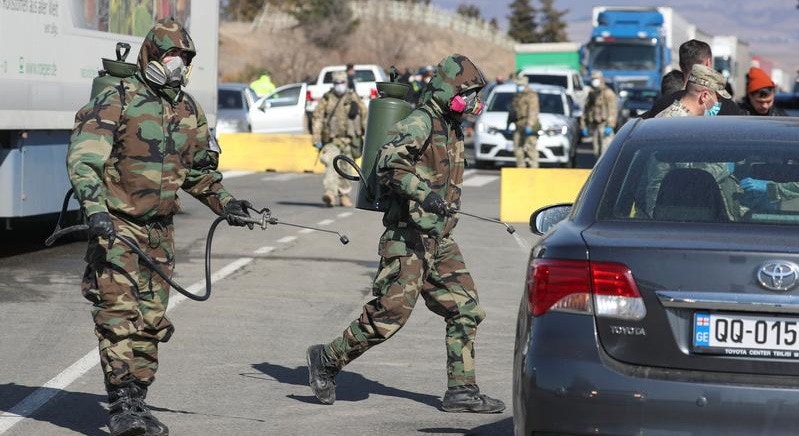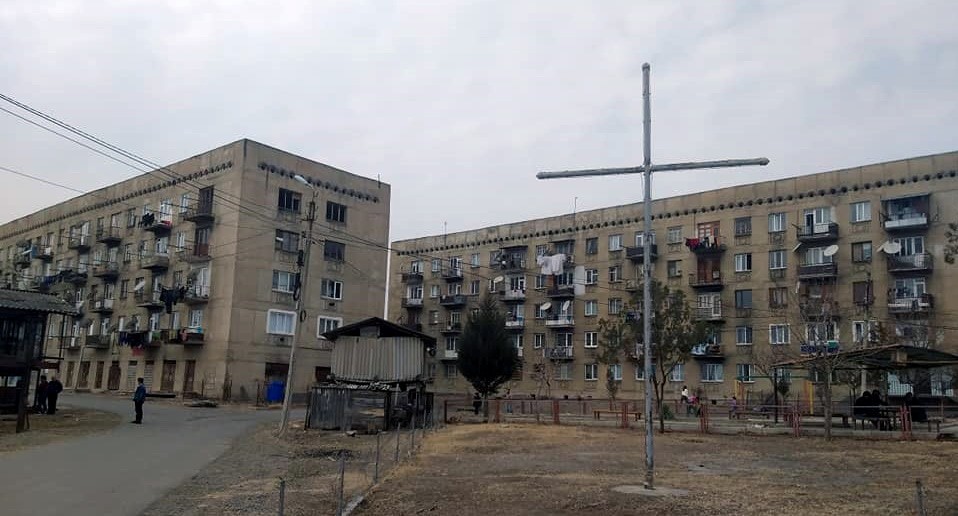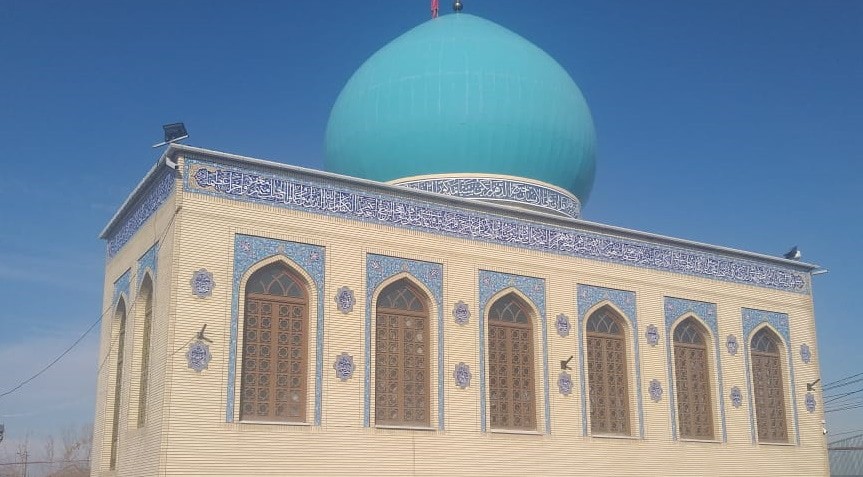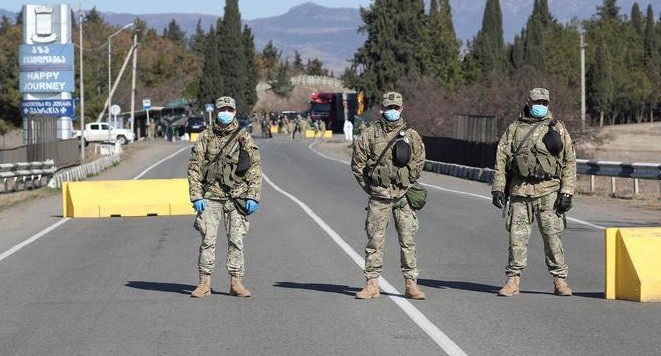
Two districts of the Georgian region of Kvemo Kartli became a hotbed of risk for the spread of the coronavirus infection, and a strict quarantine is introduced in those districts. The region is compactly populated by Azerbaijani natives, many of whom do not know the Georgian language. What the authorities are doing, what local residents are afraid of, why students are not able to attend distance lectures, and how the language barrier prevents people from maintaining social distancing, – read about these and other problems described for the "Caucasian Knot" by Alexander Kvakhadze, a researcher of the "Rondeli Foundation".
***
Since March 23, the Marneuli and Bolnisi Districts of the Georgian region of Kvemo Kartli are closed to a strict quarantine because of the coronavirus infection. The decision about the introduction of increased measures to combat COVID-19 was made after a 62-year-old woman from Marneuli had been diagnosed with the coronavirus infection. She had a contact with her sister, who had earlier visited Azerbaijan. Despite her fever, the woman from Marneuli diagnosed with the coronavirus infection stayed in contact with a large number of people: epidemiologists identified more than 80 contacts and warned that other contacts would likely be identified.

Four family members of the woman diagnosed with the coronavirus decease are already hospitalized, and they are also infected with the coronavirus infection. The whole "Geo Hospital", where the patient had been treated for several days before she was diagnosed with the coronavirus decease, was placed under quarantine. At present, the woman is in critical condition, and doctors use an artificial respiration unit to help the patient breath.
The region is mainly populated by ethnic Azerbaijanis. According to the Georgian census of 2014, 104,300 people live in the Marneuli municipality, including 83.77% of Azerbaijanis, 8.58% of Georgians, and 6.99% of Armenians. 53,590 people live in the Bolnisi municipality: of them, 63.38% are Azerbaijanis, 30.91% are Georgians, and 5.02% are Armenians (Note 1). Highways connecting Georgia with Armenia and Azerbaijan pass through the region.
Entry to and exit from the region is restricted because of the quarantine. Only doctors and food wholesalers are permitted to enter the region. All central and bypass roads connecting the region with the rest of Georgia are blocked and controlled by soldiers. The ban does not apply to transit of goods.

The border checkpoints in Sadakhlo (the Georgian-Armenian border) and Red Bridge (the Georgian-Azerbaijani border) are closed for civil movement. Only Georgian citizens are allowed to enter the territory of Georgia, and upon their arrival in their country they will be placed under quarantine. Special quarantine facilities have been built near the above-mentioned checkpoints.
In the very region, everything is closed except for grocery stores, pharmacies, and infrastructure objects of crucial need for the population. In Marneuli and Bolnisi, most companies transferred their employees to work from home. Land cultivation and other spring agricultural works will be carried out under the supervision of agents sent by the Ministry for Public Health. Marneuli Mayor Zaur Dargaly actively urges residents of his region to stay home and keep social distancing (Note 2). Residents of the high-mountainous villages of the region, distant from Marneuli and Bolnisi, fear a shortage of food and medicine.

The strict quarantine has immediately affected the economy of the region, where trade is one of the crucial industries. The city of Marneuli is actually an economic centre for the Marneuli, Bolnisi, Dmanisi, and Tetri-Tskaro Districts. The Marneuli Market, one of the central shopping centres of the entire Kvemo Kartli region, is closed because of the quarantine.
"The life has just stopped here," the "Caucasian Knot" correspondent has been told by Polad Askerov, a resident of the Kyzyladjlo village, who has been engaged in trade for many years. And the man continues: "Many people are engaged in trade here, and a lot of them took loans. And everything has stopped now. This will further complicate the economic situation of local residents."
In Marneuli, few people can now be seen in the streets, says Agil Mustafaev, the leader of the opposition "United National Movement" (UNM) Party in the region. Markets and cafes are closed. People only stand in lines for food or medicine. There is a shortage of antiseptics and medical masks in the city: while the authorities are busy searching for centres of infection, opposition party activists have brought and are distributing necessary preventive measures to the population.

Not only the city of Marneuli, but also the nearby villages become empty, for example, the village of Algeti. Samira Bairamova, a local resident, says that the streets of the village became empty, and route taxis which connected the village and the district centre are cancelled. So, people cannot leave the village.
According to Samira Bairamova, residents of the region do not have enough information about the new virus. Many people consider coronavirus to be ordinary influenza, and some generally doubt its existence. "My uncle visited us in the evening. He says that the coronavirus is 'a performance of Americans who want to kill the population.' I say that he is wrong, but he does not believe me," Samira complains.
The language barrier has also become a problem for the population of the region, because many of Azerbaijani natives who live there do not speak Georgian. In this regard, the local Azerbaijanis' youth platform "Salam" launched a "stay-at-home" campaign on the social network. Young activists record videos in the Azerbaijani language, in which they call on people to stay at home. "Our community underestimates the risk of the coronavirus infection. We are launching our campaign to get as many people as possible aware of the danger," stated Elnur Alisoi, one of the leaders of the youth platform "Salam".
The quarantine affects not only the economy, but also education. Students from the region, who studied at Tbilisi universities, are now transferred to distance learning. They face the problem of poor-quality Internet connection, and that does not allow them listening to lectures remotely. "I live in the high-mountainous village of Darbazi. Our internet connection is poor, and because of that fact I can't listen to computer lectures in a normal way," said Nashir Ordukhanov, a university student, a resident of the Bolnisi municipality. According to him, many other students in the region also face such a problem.
Restrictions also affected the religious sphere. Even before the region had been declared a quarantine zone, the Marneuli and Bolnisi municipalities cancelled the festivities on the occasion of the Novruz Bayram holiday, traditional for Azerbaijanis.

Leaders of the local Shiite community cancelled Friday prayers and urged the population to pray at home. The very mosque of Imam Ali in Marneuli was subjected to disinfection. The restrictions have also been introduced by the Marneuli and Khujab dioceses of the Georgian Orthodox Church. Priests will pray in temples, and believers will pray at home.
The lack of public awareness of the coronavirus infection is not the only factor increasing the risk of its spread in the Kvemo Kartli region. Another factor is the cultural traditions of the local population, first of all, a crowded funeral or wedding ceremonies.
Although all wedding salons are closed in the region, it is difficult for the authorities to convince local people to maintain social distancing during mourning events. In an attempt to prevent the uncontrolled spread of the coronavirus infection, doctors subject residents of the Marneuli and Bolnisi districts to mass measuring of temperature. The authorities also do not rule out the prospects of mass testing for the coronavirus infection.

Meanwhile, so far, in Georgia, in comparison with other countries, the spread of the coronavirus infection has not become so rampant and massive. And the Georgian authorities convince the population that the situation is under control. Despite the above facts, Georgian epidemiologists suggest that the number of coronavirus-infected people is likely to increase in the coming weeks, because there is a risk of new infection foci appearing.
For fear of outbreaks of an epidemic like in Italy, the authorities of Georgia introduced a state of emergency throughout the whole territory of the country until April 21. The dynamics of new infection cases in the coming weeks will show whether the strict control measures in the Marneuli and Bolnisi municipalities will help reduce the spread of the coronavirus infection. So far, it is only clear that the COVID-19 pandemic will inflict a powerful blow on the economy of Georgia, especially the regions under the quarantine.
Author: Alexander Kvakhadze, a researcher of the "Rondeli Foundation". The material has been prepared for the "Caucasian Knot" exclusively.
NOTES
- The national composition of the population of Georgia, its regions, cities, and towns in accordance with the 2014 census // Data from the website http://pop-stat.mashke.org/georgia-ethnic-loc2014.htm
- In Georgia, the term "social distancing" (adopted from English) is actively used in connection with the pandemic and involves minimizing contacts with strangers and refusing public events or gatherings. In the case of mourning rituals, it is about maintaining a safe distance between people.